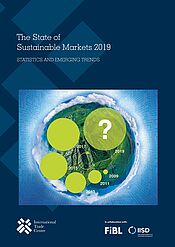The State of Sustainable Markets: Statistics and Emerging Trends 2019

This year’s report points out that the share of certified agricultural land is expanding and that this trend likely to continue.
The State of Sustainable Markets: Statistics and Emerging Trends 2019 is the fourth in what is now an annual update on the state of sustainable markets, based on the annual global survey on sustainability standards. The report is based on a partnership between the Research Institute of Organic Agriculture (FiBL), the International Institute of Sustainable Development (IISD) and the International Trade Centre (ITC), and is supported by the Swiss State Secretariat for Economic Affairs (SECO).
The report provides a snapshot of substantial growth of sustainability standards for bananas, cocoa, coffee, cotton, oil palm, soybean, sugarcane, tea and forestry products. It points out that the share of certified agricultural land is expanding and that this trend likely to continue.
Among the highlights of this year’s report:
Cotton: triple-digit growth in certified land
The report notes that in the past five years, land area dedicated to growing certified cotton has grown by 172 %. Meanwhile, land certified as sustainable for sugarcane grew by 80 %, whereas for cocoa, it more than doubled.
In 2016–2017, the certified areas for the nine commodities increased at least 18 %, led by sugarcane and cotton. At least 17.9 million hectares of farmland for nine agricultural crops singled out in this report were certified in 2017, equalling 7.6 % of the total area for them.
Organic farmland covers the greatest area. In fact, almost 70 million hectares – roughly the size of Myanmar – were certified as organic in 2017, representing 1.4 % of the world’s farmland– but most of the other standards have grown more in recent years.
Single-commodity standards dominate
The report finds that single-commodity standards such as Better Cotton Initiative, 4C, Roundtable on Sustainable Palm Oil and Round Table on Responsible Soy are by far the largest standards in the coffee, cotton, forestry, oil palm, sugarcane and soybean sectors. It suggests that standards that directly target mainstream adoption within a specific sector largely drive growth and market uptake.
The rising area and production volume covered by sustainability standards signals that there is "significant potential for further growth", according to the report.
The 14 standards organizations that provided data for the report are 4C, Better Cotton Initiative, Bonsucro, Cotton made in Africa, GLOBALG.A.P., Fairtrade International, Forest Stewardship Council, IFOAM – Organics International, the Programme for the Endorsement of Forest Certification, ProTerra Foundation, Rainforest Alliance, the Roundtable on Sustainable Palm Oil, the Round Table on Responsible Soy and UTZ.
About the Global Survey on Voluntary Sustainability Standards (VSS)
The PDF version of "The State of Sustainable Markets: Statistics and Emerging Trends 2019" may be downloaded on the website of the International Trade Centre ITC.
stage.intracen.org: "The State of Sustainable Markets: Statistics and Emerging Trends 2019"
 tap and then scroll down to the Add to Home Screen command.
tap and then scroll down to the Add to Home Screen command.